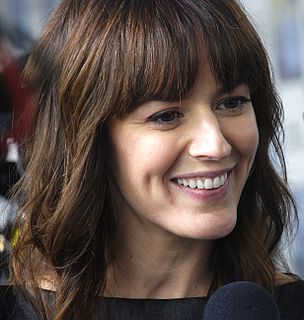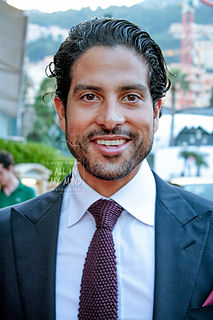A Quote by Annie Lennox
More than anything, I think everything about appearance is illusory. People see you, and they think they understand what you're projecting, but actually, they have their own interpretation of it, or they put a label on you.
Related Quotes
I think the fans, if you want to actually learn about us, I think you have to go way more intricate than just what you see on TV, because that's whatever they want to report. But it's just so much going on, and when you talk about being in our world you have to understand we're individuals too. We're not just athletes. No, we're fathers, we're sons. So when you put us through a job shortage you take away everything that we built.
When I talk about feminism and what I think the women's movement needs more of, it's not to detract from anything going on - I think everything going on is fantastic - but there's this missing element. I think we could learn from our detractors a little bit because I feel like they have a plan, a better understanding of things than we necessarily do. You can't change things if you don't understand the other people involved. And if you don't understand yourself, you'll never change.
I'm not naive. Sometimes interpretation is more of an art than a science. There are those who would label interpretation absolutely anything a judge might do or, two, the text of a statute or the Constitution. But it seems to me there comes a point where a judge is using his own creativity and purpose and crosses the line between interpreting a text written by somebody else and in a sense creating something new.
I think in the old music, everything was so competitive. It was all about - very selfish in a lot of ways. The label sort of capitalized on that desperation and that competition. In the new music landscape, with is the democratization of the internet and music in general, I think it can be a lot more collaborative. People, instead of competing, they can actually support each other, in music.
I didn't know enough as a writer to understand why I needed to do this, but I understood in a very gut way that I could not entertain those thoughts of pleasing people and write this book - that it would be a very different book. Without really sort of investigating that instinct, which I'm glad for, I just made a conscious decision to put blinders on and not think about anything and put it all in. And I did. I put everything in. I had to look at the whole picture to see what I needed.
In a way, I think this album is stronger than the last one - in terms of not hiding behind anything. So in a way, I see this album as fiercer than the last. I just find it interesting hearing what people think. If that's people's interpretation, then that's valid and interesting. It's hard to try and neatly place a record like that.
It's not about what you achieve, it's actually what you do for your industry and that's what I think is important. And when people look at me and they see my achievements with the restaurants do you know what I think? I think I did more than that. What I achieved was teaching young men and young women when they were young and inspiring them.
I really think, if anything, there is more evidence to show that the violent games reduce aggression and violence. There have actually been some studies about that, that it's cathartic. If you go to QuakeCon and you walk by and you see the people there [and compare that to] a random cross section of a college campus, you're probably going to find a more peaceful crowd of people at the gaming convention. I think it’s at worst neutral and potentially positive.
What people don't understand about making a film is sometimes your experience on the film shapes who you are. You're gone to another country for five months, maybe more, there's training leading up to it... It's a whole life experience that people don't see because they just see the final product wrapped up in a couple hours. You don't see everything that happens around it. I think it's hard to say one movie or one thing; I think they all shape who you are.



































